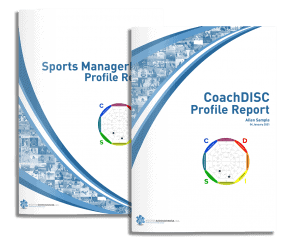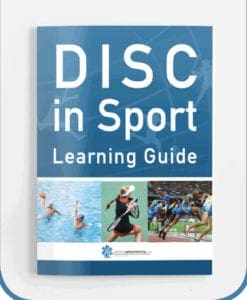By Lahnee Pavlovich, Head of Research and Writing, Athlete Assessments
Beginning a lecture by explaining DISC theory may not sound exciting. But when the theory relates to how the students can find the best suited post graduate job, they tend to listen more carefully.
This was the case in Associate Professor, Dr Gonzalo Bravo’s Leadership in Sport Management class at West Virginia University.
As part of Athlete Assessments’ Academic Services, Bo Hanson provided Dr Bravo’s class with a guest lecture to help the students understand how DISC could help them in securing the right post graduate job for them. The students completed the Athlete Assessments’ Sports ManagerDISC Profile assessment and then used the information collated through their DISC Reports to understand how they are more or less attracted, and suited, to real life post graduate jobs.
“A big part of the process of working with the students in their class was giving them practical strategies that would help prepare them for the real world of workplace environments,” Bo said.
“As such, we discussed how different DISC profiles are suited to different types of job roles. Many employees tend to ‘just happen’ upon a role and only once they have started do they feel like the role is either a ‘good fit’ or not.
“However, Dr Bravo has a very different focus in terms of how to prepare his students for success in finding a role that suits them well. He makes sure they are going into the post graduate job market with their eyes wide open.”
Dr Bravo said he wanted to bring something unique and specific to each student.
“I believe that in any topic on which you lecture discussing the general principles for that topic and the latest research findings is without any doubt the right approach, particularly when you discuss complex issues like the application of leadership skills,” he said.
“But the problem with this ‘general approach’ is that some students will always challenge these general principles thinking “…oh well, but that is not me”. The Sport ManagerDISC profile provides a one-by-one individual report of an array of aspects related to individual traits and behavioral styles of people,”
“That’s what I found most interesting about the Sport ManagerDISC and that’s why I decided to include it in my class.
“At the end, to understand the leadership potential that exists in each of us it will require a good amount of introspection and self-awareness of not only who we are but also how we act under stress, when facing uncertainty or when having to deal with an unknown problem. The Sport ManagerDISC provides all types of information which allows us to know who we are a bit better.”
DISC profiling has been a common tool used within the corporate sector for management and leadership development for at least 30 years. DISC measures to what degree an individual exhibits the behavioral traits Dominance, Influence, Steadiness, and Conscientious behavior. Through knowing and understanding this information, an individual can build the self-awareness they need, as a team member, manager or leader to take their performance to the next level.
An interesting fact about DISC is there are no right or wrong answers. The aim is never to ‘improve’ your DISC Profile. Instead, the focus is on developing self-awareness, knowing what works for you and what doesn’t, and ultimately increasing the choices of behavior to what is most effective to the situation and those you work with.
During Dr Bravo’s class, his students were asked to prepare by firstly completing their Sports ManagerDISC Profile online survey and then using their Reports to collate their respective strengths and limitations. The students were then organized into what we would consider “like type” teams; or teams made up of similar DISC Profiles. These teams then searched for job descriptions which they felt would suit their DISC Profiles. They brought their job descriptions to class and Bo’s role was to look at these jobs and relate them to what DISC Profile would be most suited to each role.
“What we found was the sport management roles the students brought to class mapped to a respective DISC profile for up to 70-80% of the stated behaviors. What this means, is that an employer has a prospective profile they are looking for, and if a candidate has this profile, they are more likely to be well received during the application process,” Bo said.
“We finalized the class by reinforcing the process of identifying job behaviors, mapping these to a DISC Profiles and then comparing this to a student’s actual profile to determine fit and suitability. Where they found 80% suitability, we then looked at the ‘adaptations’ required to perform in the remaining 20% of the role.
“It was a hugely successful exercise and I feel the students got a lot out of discovering and understanding their DISC Profiles and how it will assist them in the real world to find a suitable post graduate job.”
Dr Bravo said it was also an easy, and highly beneficial process for his students.
“We found the Sport ManagerDISC very easy to use. Completing the survey takes at the most 10-12-minutes…. but what was really surprising was the amount of result details, which I believe was well received by the students as well,” Dr Bravo said.
“And I believe, most of the students (if not all) were not only positively surprised but also they were very satisfied with the process. I asked them to write a post survey reflection and I was highly surprised of how seriously they took this assignment. When I read these reflections I noticed that many students put a significant amount of heart and thought when attempting to make sense of these results,”
“Bo and the staff at Athlete Assessment know the sport industry very well from the inside. So, it is very easy for them to relate, interpret and understand how tools like the Sport ManagerDISC profile can be applied to each specific context, whether these relationships are between coaches and athletes or between managers and staff. I also believe that this aspect also gives Bo and associates the legitimacy to talk with confidence and credibility.”
Dr Gonzalo Bravo’s Bio:
 Gonzalo Bravo, a native of Santiago, Chile, completed his master’s in sport administration from Pennsylvania State University (1991) and a Ph.D. in Sport Management from The Ohio State University (2004).
Gonzalo Bravo, a native of Santiago, Chile, completed his master’s in sport administration from Pennsylvania State University (1991) and a Ph.D. in Sport Management from The Ohio State University (2004).- Prior to joining academia, he worked for ten years (1991-2001) as the executive athletic director at Fundacion Club Deportivo Universidad Catolica, in Santiago, Chile.
- In 1994, he was invited to the Advisory Council for Sport by the president of Chile to lead a research project to establish the base for the Law of Sport in Chile.
- In the fall of 2004, he joined the Sport Management program at WVU, where he currently teaches undergraduate and graduate courses in sport governance, sport in the global market, research methods, and history and philosophy of sport.
- Since 2005, Bravo has presented his research at the annual conferences of the North American Society of Sport Management (NASSM), North American Society for the Sociology of Sport (NASSS), and the International Society for Comparative Physical Education and Sport (ISCPES). He has also been invited to present lectures and keynote speeches in Brazil, Chile, China, Macao, Japan, Korea, Mexico, and Venezuela. In 2008 and 2009, he became instrumental in the creation of two Latin American academic organizations related to the study of sport: the Latin American Association for Sport Management (ALGEDE) and the Latin American Association for Socio-cultural Studies in Sport (ALESDE).











